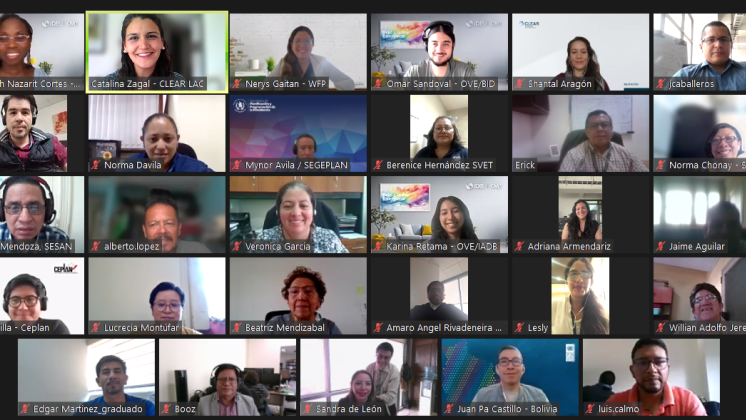Collaboration is Key to Enhancing Evaluation Systems in Guatemala

Shantal Aragón is the Evidence Use Manager of the Center for Learning on Evaluation and Results for Latin America and the Caribbean (CLEAR-LAC), an implementing partner of the Global Evaluation Initiative. We appreciate the feedback provided by Catalina Zagal from CLEAR-LAC; Emil Salim, Karina Retama, and Margrieth Nazarit from the Inter-American Development Bank Office of Evaluation and Oversight (IDB-OVE); and Mynor Ávila and Sinthia Morán from Guatemala's Secretariat of Planning and Programming of the Presidency (SEGEPLAN).
Collaboration is key to success in monitoring and evaluation (M&E) systems. This is a lesson well learned in the work of the Center for Learning on Evaluation and Results for Latin America and the Caribbean (CLEAR-LAC) in Guatemala.
CLEAR-LAC works with the Office of Evaluation and Oversight at the Inter-American Development Bank (IDB-OVE) in Guatemala to strengthen M&E systems and build solid links between national and international evaluation actors - these enduring relationships have proved critical to making the work a success.
Collaboration Builds Solid M&E Systems
In Guatemala, the Secretariat of Planning and Programming of the Presidency (SEGEPLAN) is the evaluation authority. It provides guidelines on planning and evaluation, assists evidence-informed decision-making, and enhances the skills of M&E professionals. However, to benefit the wider M&E ecosystem—in ministries, other public institutions, and academia—CLEAR-LAC and IDB-OVE had to collaborate beyond SEGEPLAN.
In 2021, the National Evaluation Capacity Index (INCE) collected its first data to diagnose Guatemala’s evaluation system. In doing so, INCE created a network of M&E contacts from the public sector, international cooperations, and academia. In 2023, to run in-depth diagnostics, identify champions, train professionals, and strengthen country networks, IDB-OVE and SEGEPLAN plugged into this network so that INCE could carry out a second diagnosis with new inputs for the end-of-year work plan. CLEAR-LAC has recently joined this key partnership to bolster ties between national M&E stakeholders and enhance Guatemala’s M&E systems.
A New Push in a New National Context
To further strengthen the evaluation systems in Guatemala, a steering group was formed, made up of a technical team, SEGEPLAN, CLEAR-LAC, IDB-OVE, and representatives from other government institutions. In recent months, SEGEPLAN, CLEAR-LAC, and IDB-OVE organized a workshop for government institutions, academies, international organizations, and evaluators to showcase INCE's 2023 diagnosis. The aim of the workshop was to encourage institutions to reinforce structures, increase the use and quality of evidence, and collaborate on a joint work plan by year's end.
CLEAR-LAC will also identify the training requirements of SEGEPLAN staff and other institutions, and incorporate lessons learned from Mexico, Chile, and elsewhere, to help shape Guatemala's evaluation system. It is worth highlighting that Guatemala’s new authorities—sworn in on January 14, 2024—have been actively involved in raising awareness of the importance of evaluation and formalizing institutional ties to support M&E activities. The openness of SEGEPLAN, and other Guatemalan institutions, to develop a 2024 working agenda has helped create an enabling environment for systemic change that fosters greater accountability and transparency in public administration.
The collaborative effort, supported by the links between key national and regional partners, such as IDB-OVE, with support from the Global Evaluation Initiative (GEI), is helping to ensure that progress in building evaluative capacity in Guatemala is sustainable and impactful.